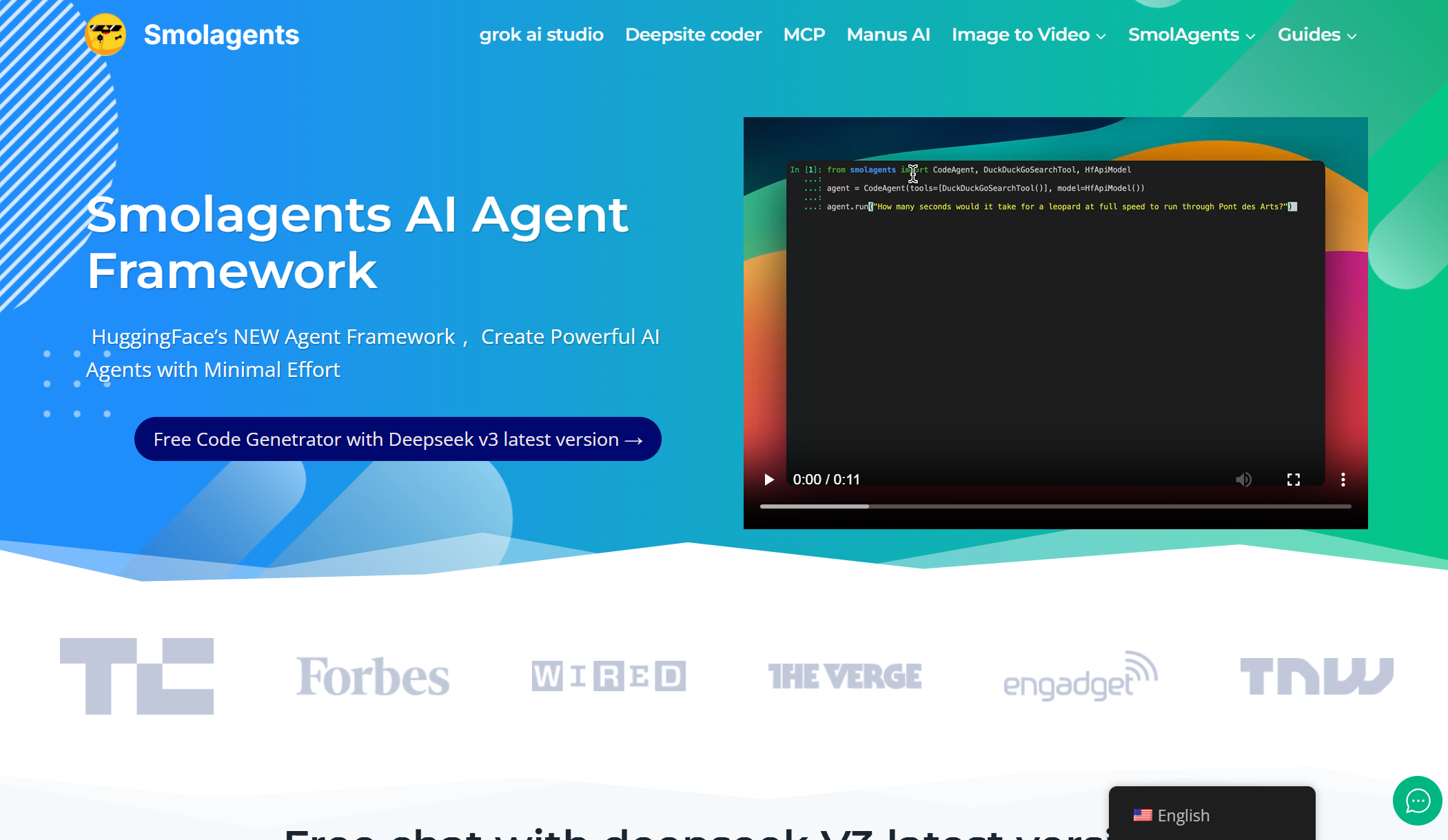
- AI Developers & Engineers: Rapidly prototype agentic systems that interact with real-world tools and data.
- ML Practitioners & Researchers: Compare JSON-based vs. code-based agent paradigms and build multi-step workflows.
- Open-Source Contributors: Extend tools, integrate new models, or enhance sandboxing via community-driven code.
- Educators & Learners: Understand agent design and workflows through clear, minimal code.
- Enterprise Teams: Deploy secure, sandboxed agents with Docker, E2B, or WebAssembly environments.
- Automation Engineers: Build agents capable of web browsing, data extraction, code evaluation, or multimodal tasks via tool integrations.
How to Use Smolagents?
- Install the Package:
CopyEdit
pip install smolagents[toolkit]
-Create Your Agent:
python
CopyEdit
from smolagents import CodeAgent, DuckDuckGoSearchTool, InferenceClientModel
agent = CodeAgent(tools=[DuckDuckGoSearchTool()], model=InferenceClientModel())
- Run a Task:
CopyEdit
agent.run("Search latest news on AI and summarize key points")
The framework supports both code agents (which emit Python code to execute) and traditional tool-calling agents (with JSON-based tool invocation).
- Sandbox Execution: Run code in secure environments via Docker, E2B, or WebAssembly to ensure safe operation.
- Use Any LLM: Plug in local models (Transformers, Ollama) or hosted services (OpenAI, Anthropic, HF Inference) through LiteLLM integration.
- Share & Reuse Tools: Import or export tools and agents via Hugging Face Hub as reusable modules.
- Minimalist Architecture: Entire agent logic resides in ~1,000 lines—simple to inspect and modify.
- Code-Based Agents: Rather than JSON, agents generate executable Python code, enabling richer logic and fewer LLM calls.
- Modality & Tool Agnostic: Handles text, vision, audio, and video inputs; integrates with LangChain, Spaces, and custom tools.
- Secure Execution: Built-in support for secure execution via sandboxing using Docker, E2B, or Pyodide.
- Model Flexibility: Works with any LLM—from open-source transformer models to proprietary APIs.
- Seamless Reusability: Push and pull agents and tools through Hugging Face Hub for modular, shareable agent design.
- Elegant minimal design—easy to understand and contribute.
- Code agent architecture leverages Python’s full power and readability.
- Secure, sandboxed execution protects against unsafe code.
- Plug-and-play support for multiple models and tool integrations.
- Lively open-source ecosystem with Hub sharing and extensibility.
- May require setup of Docker/E2B or WASM environments for sandboxing.
- Less beginner-friendly than higher-level agent frameworks.
- Limited out-of-the-box UI or workflow tooling compared to commercial alternatives.
Custom
Custom
Proud of the love you're getting? Show off your AI Toolbook reviews—then invite more fans to share the love and build your credibility.
Add an AI Toolbook badge to your site—an easy way to drive followers, showcase updates, and collect reviews. It's like a mini 24/7 billboard for your AI.
Reviews
Rating Distribution
Average score
Popular Mention
FAQs
Similar AI Tools


Radal AI
Radal AI is a no-code platform designed to simplify the training and deployment of small language models (SLMs) without requiring engineering or MLOps expertise. With an intuitive visual interface, you can drag your data, interact with an AI copilot, and train models with a single click. Trained models can be exported in quantized form for edge or local deployment, and seamlessly pushed to Hugging Face for easy sharing and versioning. Radal enables rapid iteration on custom models—making AI accessible to startups, researchers, and teams building domain-specific intelligence.


Radal AI
Radal AI is a no-code platform designed to simplify the training and deployment of small language models (SLMs) without requiring engineering or MLOps expertise. With an intuitive visual interface, you can drag your data, interact with an AI copilot, and train models with a single click. Trained models can be exported in quantized form for edge or local deployment, and seamlessly pushed to Hugging Face for easy sharing and versioning. Radal enables rapid iteration on custom models—making AI accessible to startups, researchers, and teams building domain-specific intelligence.


Radal AI
Radal AI is a no-code platform designed to simplify the training and deployment of small language models (SLMs) without requiring engineering or MLOps expertise. With an intuitive visual interface, you can drag your data, interact with an AI copilot, and train models with a single click. Trained models can be exported in quantized form for edge or local deployment, and seamlessly pushed to Hugging Face for easy sharing and versioning. Radal enables rapid iteration on custom models—making AI accessible to startups, researchers, and teams building domain-specific intelligence.

Sim Studio
Sim.AI is a cloud-native platform designed to streamline the development and deployment of AI agents. It offers a user-friendly, open-source environment that allows developers to create, connect, and automate workflows effortlessly. With seamless integrations and no-code setup, Sim.AI empowers teams to enhance productivity and innovation.

Sim Studio
Sim.AI is a cloud-native platform designed to streamline the development and deployment of AI agents. It offers a user-friendly, open-source environment that allows developers to create, connect, and automate workflows effortlessly. With seamless integrations and no-code setup, Sim.AI empowers teams to enhance productivity and innovation.

Sim Studio
Sim.AI is a cloud-native platform designed to streamline the development and deployment of AI agents. It offers a user-friendly, open-source environment that allows developers to create, connect, and automate workflows effortlessly. With seamless integrations and no-code setup, Sim.AI empowers teams to enhance productivity and innovation.
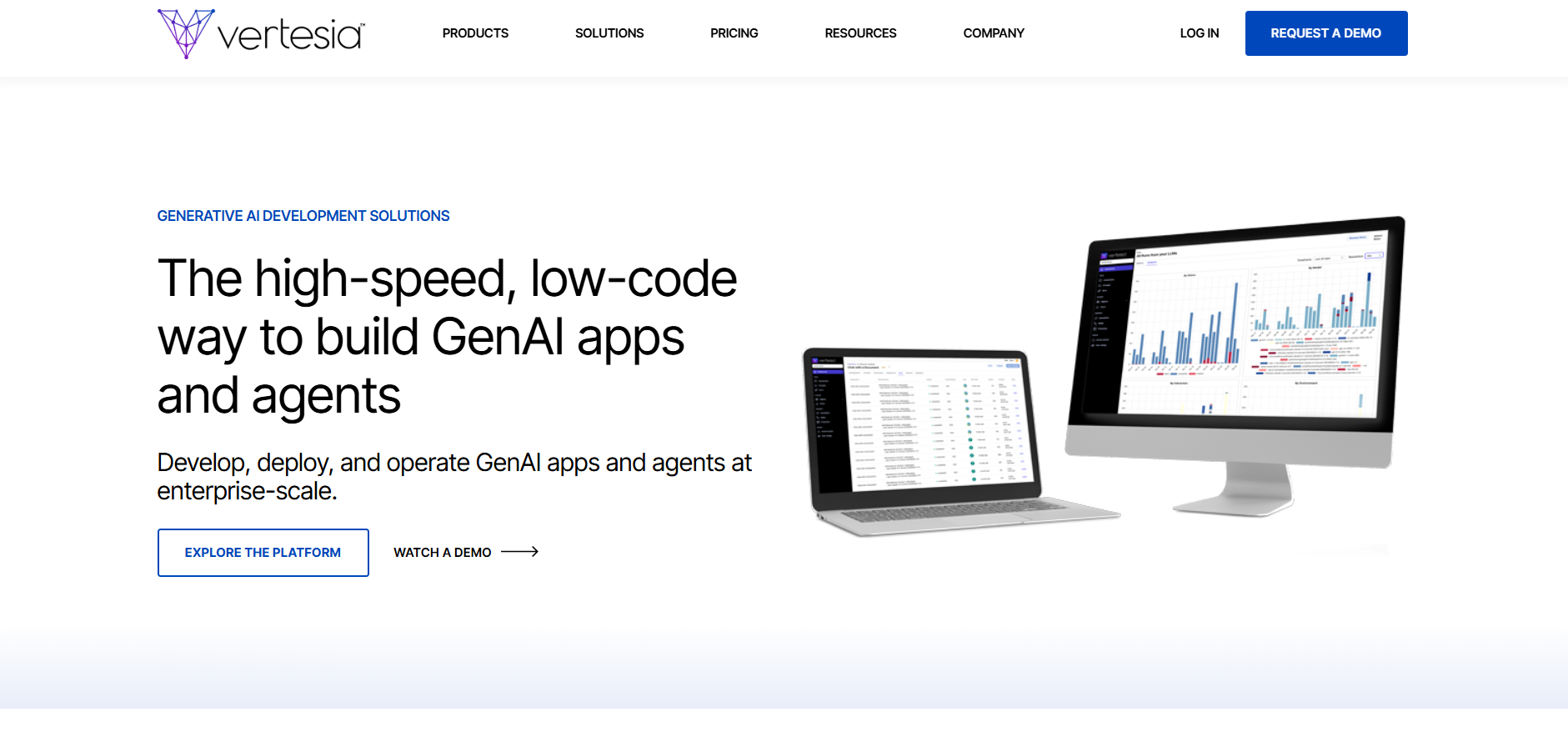

Vertesia HQ
Vertesia is an enterprise generative AI platform built to help organizations design, deploy, and operate AI applications and agents at scale using a low-code approach. Its unified system offers multi-model support, trust/security controls, and components like Agentic RAG, autonomous agent builders, and document processing tools, all packaged in a way that lets teams move from prototype to production rapidly.


Vertesia HQ
Vertesia is an enterprise generative AI platform built to help organizations design, deploy, and operate AI applications and agents at scale using a low-code approach. Its unified system offers multi-model support, trust/security controls, and components like Agentic RAG, autonomous agent builders, and document processing tools, all packaged in a way that lets teams move from prototype to production rapidly.


Vertesia HQ
Vertesia is an enterprise generative AI platform built to help organizations design, deploy, and operate AI applications and agents at scale using a low-code approach. Its unified system offers multi-model support, trust/security controls, and components like Agentic RAG, autonomous agent builders, and document processing tools, all packaged in a way that lets teams move from prototype to production rapidly.

My Agents
myAgents AI is a no-code enterprise platform that allows organisations to create, deploy and manage branded AI assistants (“agent replicas”) that embed corporate playbooks, workflows and guidance into day-to-day employee interactions. The platform is aimed at boosting productivity, engagement and performance by turning internal or partner best-practices into scalable AI agents that support staff with planning, follow-up, coaching, and task completion. Key features include adaptive planning agents that assign and track goals and tasks, human-in-the-loop governance for sensitive workflows, identity and access controls with enterprise-grade security (GDPR readiness, ISO 27001-certified cloud, SOC 2 control alignment), and the capability to scale consistent messaging across a workforce.

My Agents
myAgents AI is a no-code enterprise platform that allows organisations to create, deploy and manage branded AI assistants (“agent replicas”) that embed corporate playbooks, workflows and guidance into day-to-day employee interactions. The platform is aimed at boosting productivity, engagement and performance by turning internal or partner best-practices into scalable AI agents that support staff with planning, follow-up, coaching, and task completion. Key features include adaptive planning agents that assign and track goals and tasks, human-in-the-loop governance for sensitive workflows, identity and access controls with enterprise-grade security (GDPR readiness, ISO 27001-certified cloud, SOC 2 control alignment), and the capability to scale consistent messaging across a workforce.

My Agents
myAgents AI is a no-code enterprise platform that allows organisations to create, deploy and manage branded AI assistants (“agent replicas”) that embed corporate playbooks, workflows and guidance into day-to-day employee interactions. The platform is aimed at boosting productivity, engagement and performance by turning internal or partner best-practices into scalable AI agents that support staff with planning, follow-up, coaching, and task completion. Key features include adaptive planning agents that assign and track goals and tasks, human-in-the-loop governance for sensitive workflows, identity and access controls with enterprise-grade security (GDPR readiness, ISO 27001-certified cloud, SOC 2 control alignment), and the capability to scale consistent messaging across a workforce.
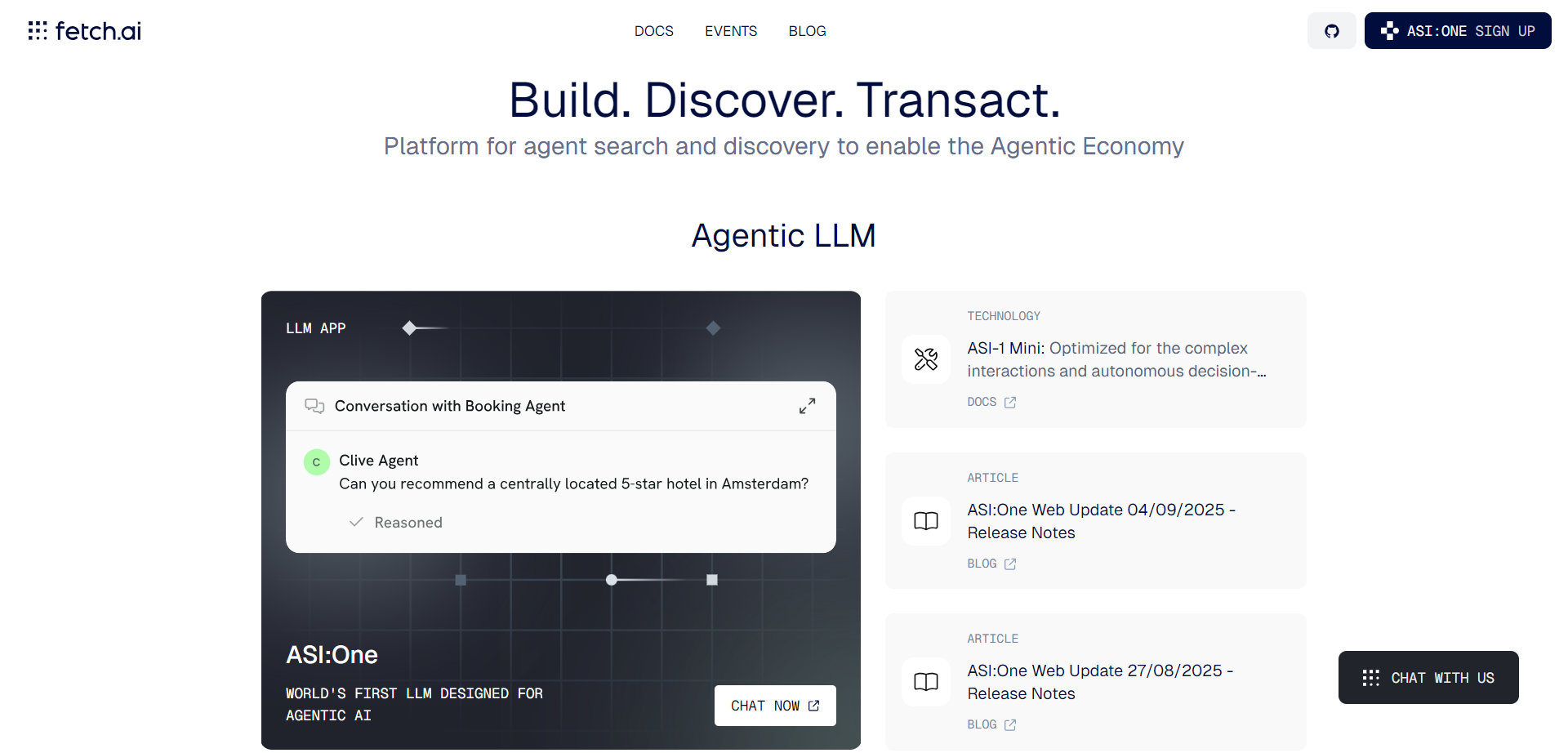

Fetch.ai
Fetch.ai is a decentralized AI platform built to power the emerging agentic economy by enabling autonomous AI agents to interact, transact, and collaborate across digital and real-world environments. The platform combines blockchain technology with advanced machine learning to create a network where millions of AI agents operate independently yet connect seamlessly to solve complex tasks such as supply chain automation, personalized services, and data sharing. Fetch.ai offers a complete technology stack, including personal AI assistants, developer tools, and business automation solutions, designed for real-world impact. Its open ecosystem supports flexibility, privacy, and interoperability, empowering users and enterprises to build, discover, and transact through intelligent, autonomous AI agents.


Fetch.ai
Fetch.ai is a decentralized AI platform built to power the emerging agentic economy by enabling autonomous AI agents to interact, transact, and collaborate across digital and real-world environments. The platform combines blockchain technology with advanced machine learning to create a network where millions of AI agents operate independently yet connect seamlessly to solve complex tasks such as supply chain automation, personalized services, and data sharing. Fetch.ai offers a complete technology stack, including personal AI assistants, developer tools, and business automation solutions, designed for real-world impact. Its open ecosystem supports flexibility, privacy, and interoperability, empowering users and enterprises to build, discover, and transact through intelligent, autonomous AI agents.


Fetch.ai
Fetch.ai is a decentralized AI platform built to power the emerging agentic economy by enabling autonomous AI agents to interact, transact, and collaborate across digital and real-world environments. The platform combines blockchain technology with advanced machine learning to create a network where millions of AI agents operate independently yet connect seamlessly to solve complex tasks such as supply chain automation, personalized services, and data sharing. Fetch.ai offers a complete technology stack, including personal AI assistants, developer tools, and business automation solutions, designed for real-world impact. Its open ecosystem supports flexibility, privacy, and interoperability, empowering users and enterprises to build, discover, and transact through intelligent, autonomous AI agents.
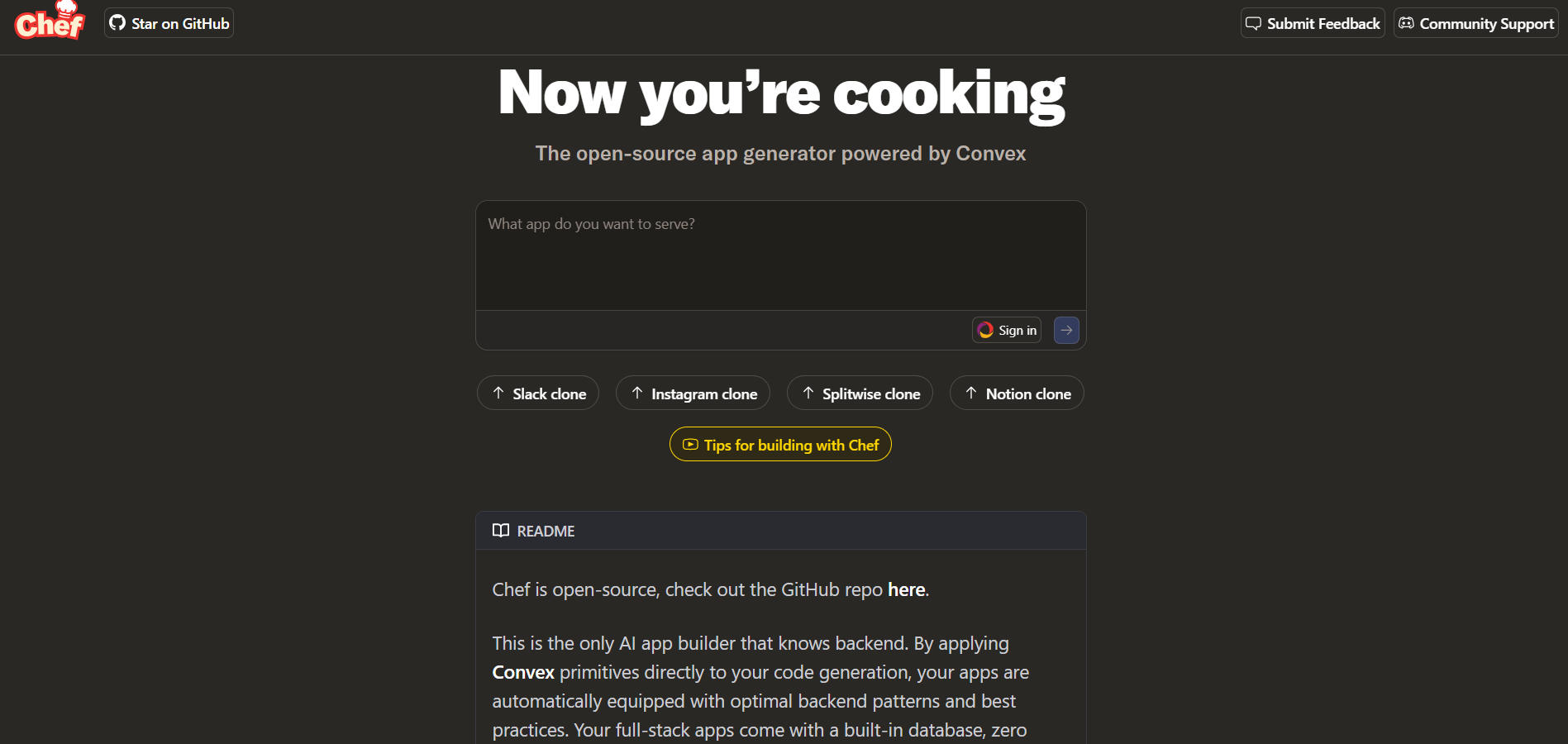

Chef
Chef by Convex is an AI-powered development assistant built to help developers create, test, and deploy web applications faster using natural language prompts. Integrated with Convex’s backend-as-a-service platform, Chef automates code generation, database setup, and API creation, enabling developers to move from concept to functional prototype within minutes. The tool understands developer intent, allowing users to describe what they want and instantly receive production-ready code snippets. With collaborative features and integrated testing environments, Chef by Convex simplifies modern app development for both individuals and teams, combining AI intelligence with backend scalability.


Chef
Chef by Convex is an AI-powered development assistant built to help developers create, test, and deploy web applications faster using natural language prompts. Integrated with Convex’s backend-as-a-service platform, Chef automates code generation, database setup, and API creation, enabling developers to move from concept to functional prototype within minutes. The tool understands developer intent, allowing users to describe what they want and instantly receive production-ready code snippets. With collaborative features and integrated testing environments, Chef by Convex simplifies modern app development for both individuals and teams, combining AI intelligence with backend scalability.


Chef
Chef by Convex is an AI-powered development assistant built to help developers create, test, and deploy web applications faster using natural language prompts. Integrated with Convex’s backend-as-a-service platform, Chef automates code generation, database setup, and API creation, enabling developers to move from concept to functional prototype within minutes. The tool understands developer intent, allowing users to describe what they want and instantly receive production-ready code snippets. With collaborative features and integrated testing environments, Chef by Convex simplifies modern app development for both individuals and teams, combining AI intelligence with backend scalability.
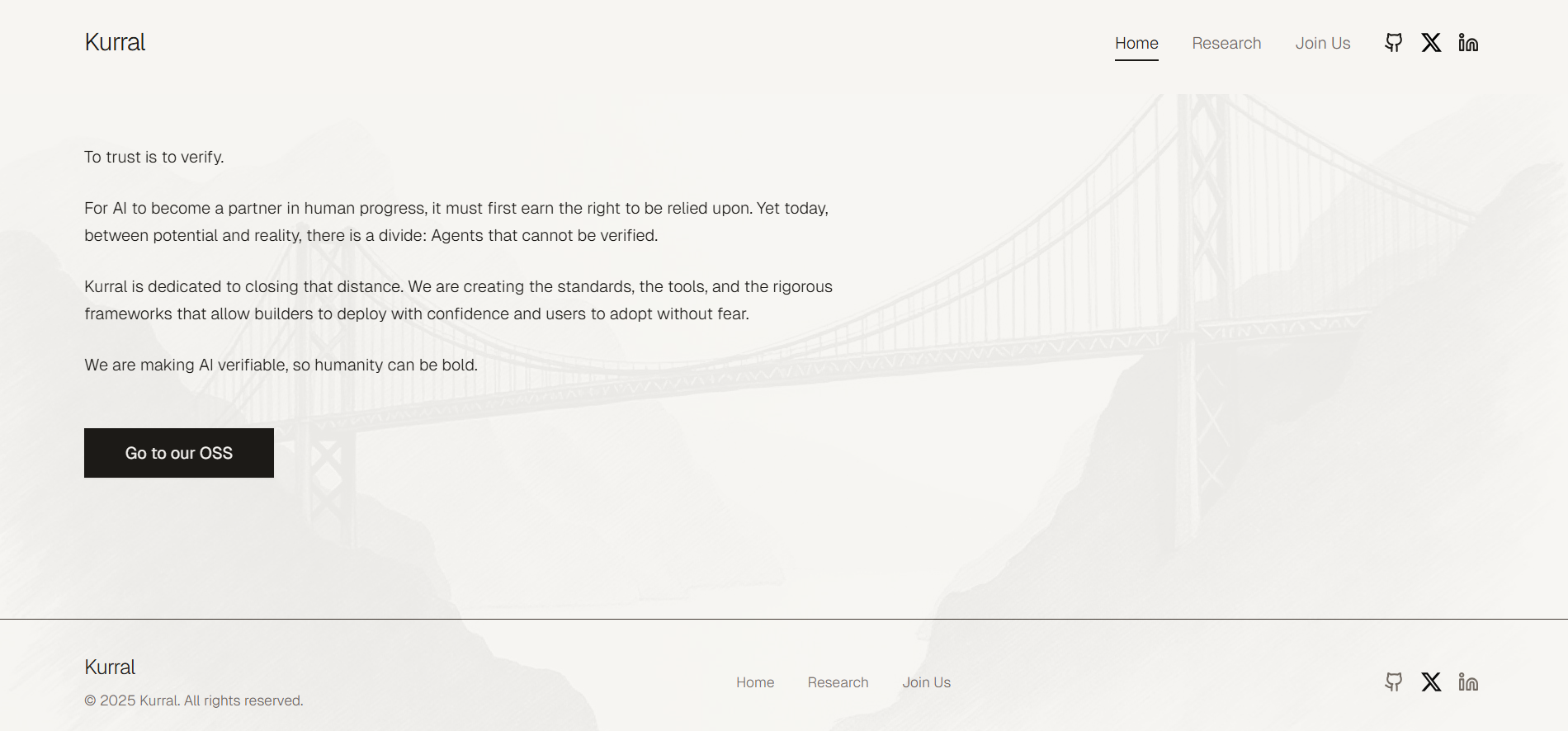

Kurral
Kurral v3 is an open-source AI agent framework designed to help developers build, experiment with, and orchestrate autonomous or semi-autonomous AI agents. It provides a structured foundation for managing agent logic, task execution, memory, and tool usage in a modular way. Rather than being a finished end-user application, Kurral v3 serves as a development layer for engineers who want full control over how agents reason, act, and interact with external systems. Its architecture emphasizes flexibility, transparency, and extensibility, making it suitable for research, prototyping, and advanced AI system design. The framework supports iterative experimentation, allowing developers to define agent behaviors, integrate custom tools, and refine workflows over time. By keeping the system open and configurable, Kurral v3 enables builders to explore different agent patterns, coordination strategies, and execution flows without being locked into a proprietary platform.


Kurral
Kurral v3 is an open-source AI agent framework designed to help developers build, experiment with, and orchestrate autonomous or semi-autonomous AI agents. It provides a structured foundation for managing agent logic, task execution, memory, and tool usage in a modular way. Rather than being a finished end-user application, Kurral v3 serves as a development layer for engineers who want full control over how agents reason, act, and interact with external systems. Its architecture emphasizes flexibility, transparency, and extensibility, making it suitable for research, prototyping, and advanced AI system design. The framework supports iterative experimentation, allowing developers to define agent behaviors, integrate custom tools, and refine workflows over time. By keeping the system open and configurable, Kurral v3 enables builders to explore different agent patterns, coordination strategies, and execution flows without being locked into a proprietary platform.


Kurral
Kurral v3 is an open-source AI agent framework designed to help developers build, experiment with, and orchestrate autonomous or semi-autonomous AI agents. It provides a structured foundation for managing agent logic, task execution, memory, and tool usage in a modular way. Rather than being a finished end-user application, Kurral v3 serves as a development layer for engineers who want full control over how agents reason, act, and interact with external systems. Its architecture emphasizes flexibility, transparency, and extensibility, making it suitable for research, prototyping, and advanced AI system design. The framework supports iterative experimentation, allowing developers to define agent behaviors, integrate custom tools, and refine workflows over time. By keeping the system open and configurable, Kurral v3 enables builders to explore different agent patterns, coordination strategies, and execution flows without being locked into a proprietary platform.
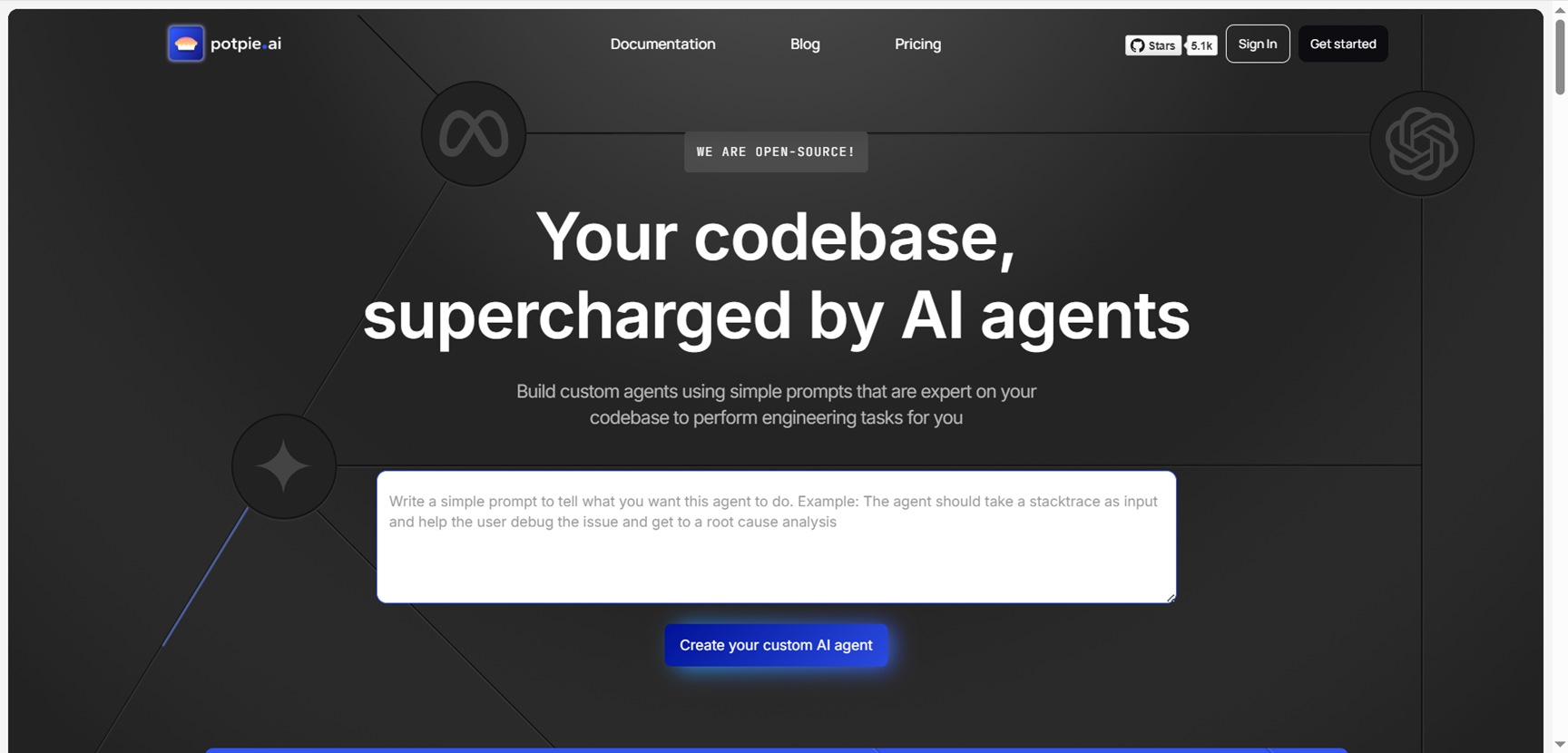

potpie.ai
Potpie.ai is an innovative AI agent platform that enables developers to create intelligent agents for their codebase in just minutes, transforming software development through automated understanding and interaction. Designed specifically for codebase analysis, it allows users to deploy AI agents that comprehend entire repositories, perform tasks like code reviews, bug detection, refactoring suggestions, and feature implementation autonomously. The platform emphasizes speed and simplicity, requiring minimal setup to integrate with existing projects on GitHub or local environments. Key capabilities include natural language queries for code exploration, multi-agent collaboration for complex workflows, and seamless integration with popular IDEs like VS Code. By leveraging advanced LLMs fine-tuned for code, Potpie.ai boosts productivity for solo developers and teams alike, making AI-assisted coding accessible without deep expertise.


potpie.ai
Potpie.ai is an innovative AI agent platform that enables developers to create intelligent agents for their codebase in just minutes, transforming software development through automated understanding and interaction. Designed specifically for codebase analysis, it allows users to deploy AI agents that comprehend entire repositories, perform tasks like code reviews, bug detection, refactoring suggestions, and feature implementation autonomously. The platform emphasizes speed and simplicity, requiring minimal setup to integrate with existing projects on GitHub or local environments. Key capabilities include natural language queries for code exploration, multi-agent collaboration for complex workflows, and seamless integration with popular IDEs like VS Code. By leveraging advanced LLMs fine-tuned for code, Potpie.ai boosts productivity for solo developers and teams alike, making AI-assisted coding accessible without deep expertise.


potpie.ai
Potpie.ai is an innovative AI agent platform that enables developers to create intelligent agents for their codebase in just minutes, transforming software development through automated understanding and interaction. Designed specifically for codebase analysis, it allows users to deploy AI agents that comprehend entire repositories, perform tasks like code reviews, bug detection, refactoring suggestions, and feature implementation autonomously. The platform emphasizes speed and simplicity, requiring minimal setup to integrate with existing projects on GitHub or local environments. Key capabilities include natural language queries for code exploration, multi-agent collaboration for complex workflows, and seamless integration with popular IDEs like VS Code. By leveraging advanced LLMs fine-tuned for code, Potpie.ai boosts productivity for solo developers and teams alike, making AI-assisted coding accessible without deep expertise.
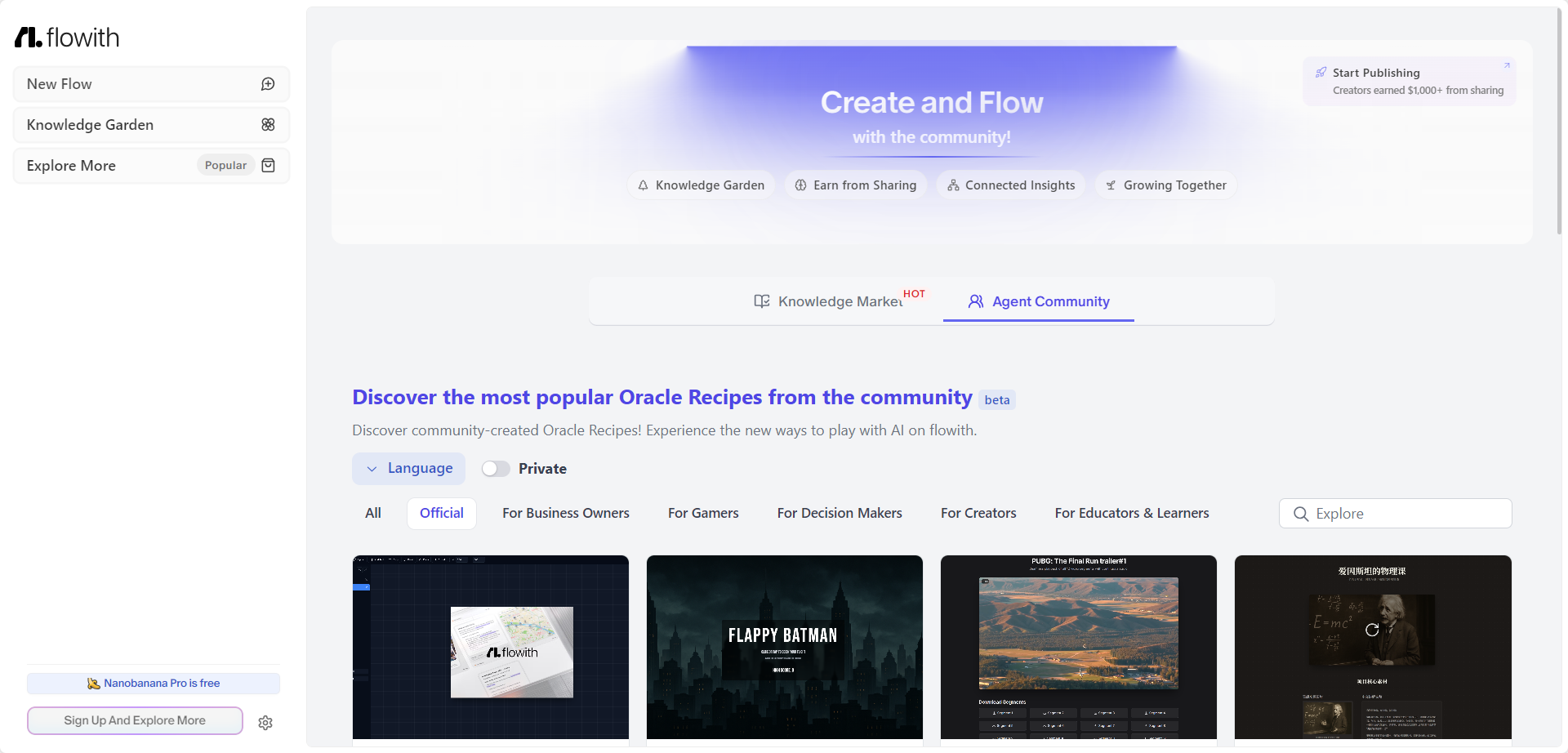
Flowith AI
Flowith.io is a revolutionary AI creation workspace that transcends traditional chat interfaces with its infinite canvas and advanced agent framework for seamless deep work. Powered by top models like GPT-4o, Claude 3.5, and DeepSeek, it enables users to organize thoughts, research, and AI interactions visually on a multi-threaded canvas. Key features include Agent Neo for executing over 1,000-step complex tasks autonomously, a personal Knowledge Garden for building knowledge bases from files and notes, and tools for generating websites, code, presentations, and multimedia. Launched in 2023 from San Francisco, it supports real-time collaboration, drag-and-drop workflows, batch processing, and integrations for content creators tackling intricate projects efficiently.

Flowith AI
Flowith.io is a revolutionary AI creation workspace that transcends traditional chat interfaces with its infinite canvas and advanced agent framework for seamless deep work. Powered by top models like GPT-4o, Claude 3.5, and DeepSeek, it enables users to organize thoughts, research, and AI interactions visually on a multi-threaded canvas. Key features include Agent Neo for executing over 1,000-step complex tasks autonomously, a personal Knowledge Garden for building knowledge bases from files and notes, and tools for generating websites, code, presentations, and multimedia. Launched in 2023 from San Francisco, it supports real-time collaboration, drag-and-drop workflows, batch processing, and integrations for content creators tackling intricate projects efficiently.

Flowith AI
Flowith.io is a revolutionary AI creation workspace that transcends traditional chat interfaces with its infinite canvas and advanced agent framework for seamless deep work. Powered by top models like GPT-4o, Claude 3.5, and DeepSeek, it enables users to organize thoughts, research, and AI interactions visually on a multi-threaded canvas. Key features include Agent Neo for executing over 1,000-step complex tasks autonomously, a personal Knowledge Garden for building knowledge bases from files and notes, and tools for generating websites, code, presentations, and multimedia. Launched in 2023 from San Francisco, it supports real-time collaboration, drag-and-drop workflows, batch processing, and integrations for content creators tackling intricate projects efficiently.
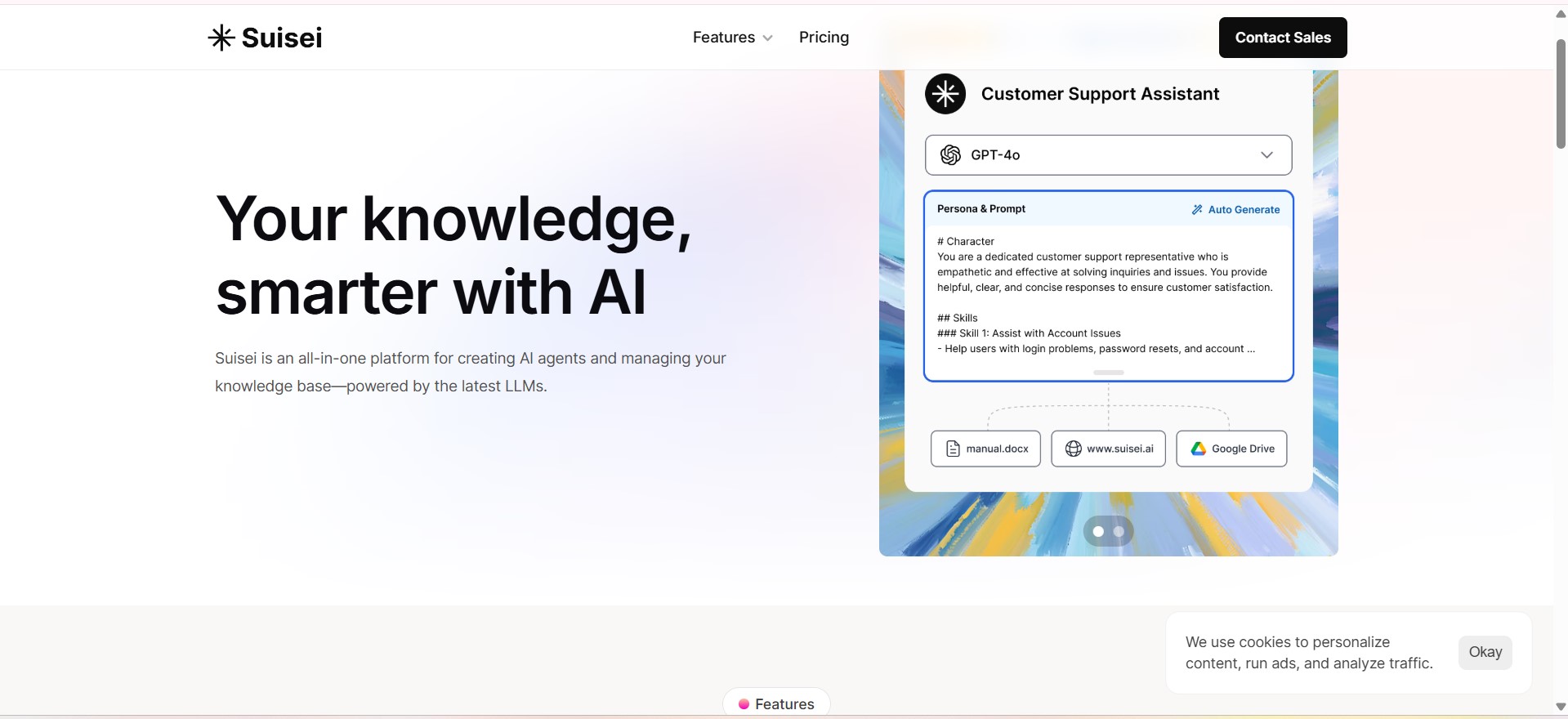

Suisei AI
Suisei AI is a modern AI platform designed to help individuals and businesses build, manage, and deploy intelligent AI agents tailored to their needs. At its core, Suisei positions itself as an all-in-one workspace for AI agents and knowledge management, powered by the latest large language models (LLMs) such as GPT, Claude, and Google’s Gemini.The platform’s primary focus is on AI agents—automated assistants that can perform a wide variety of tasks. Users can create custom AI agents without writing code, using intuitive templates or starting from scratch.


Suisei AI
Suisei AI is a modern AI platform designed to help individuals and businesses build, manage, and deploy intelligent AI agents tailored to their needs. At its core, Suisei positions itself as an all-in-one workspace for AI agents and knowledge management, powered by the latest large language models (LLMs) such as GPT, Claude, and Google’s Gemini.The platform’s primary focus is on AI agents—automated assistants that can perform a wide variety of tasks. Users can create custom AI agents without writing code, using intuitive templates or starting from scratch.


Suisei AI
Suisei AI is a modern AI platform designed to help individuals and businesses build, manage, and deploy intelligent AI agents tailored to their needs. At its core, Suisei positions itself as an all-in-one workspace for AI agents and knowledge management, powered by the latest large language models (LLMs) such as GPT, Claude, and Google’s Gemini.The platform’s primary focus is on AI agents—automated assistants that can perform a wide variety of tasks. Users can create custom AI agents without writing code, using intuitive templates or starting from scratch.
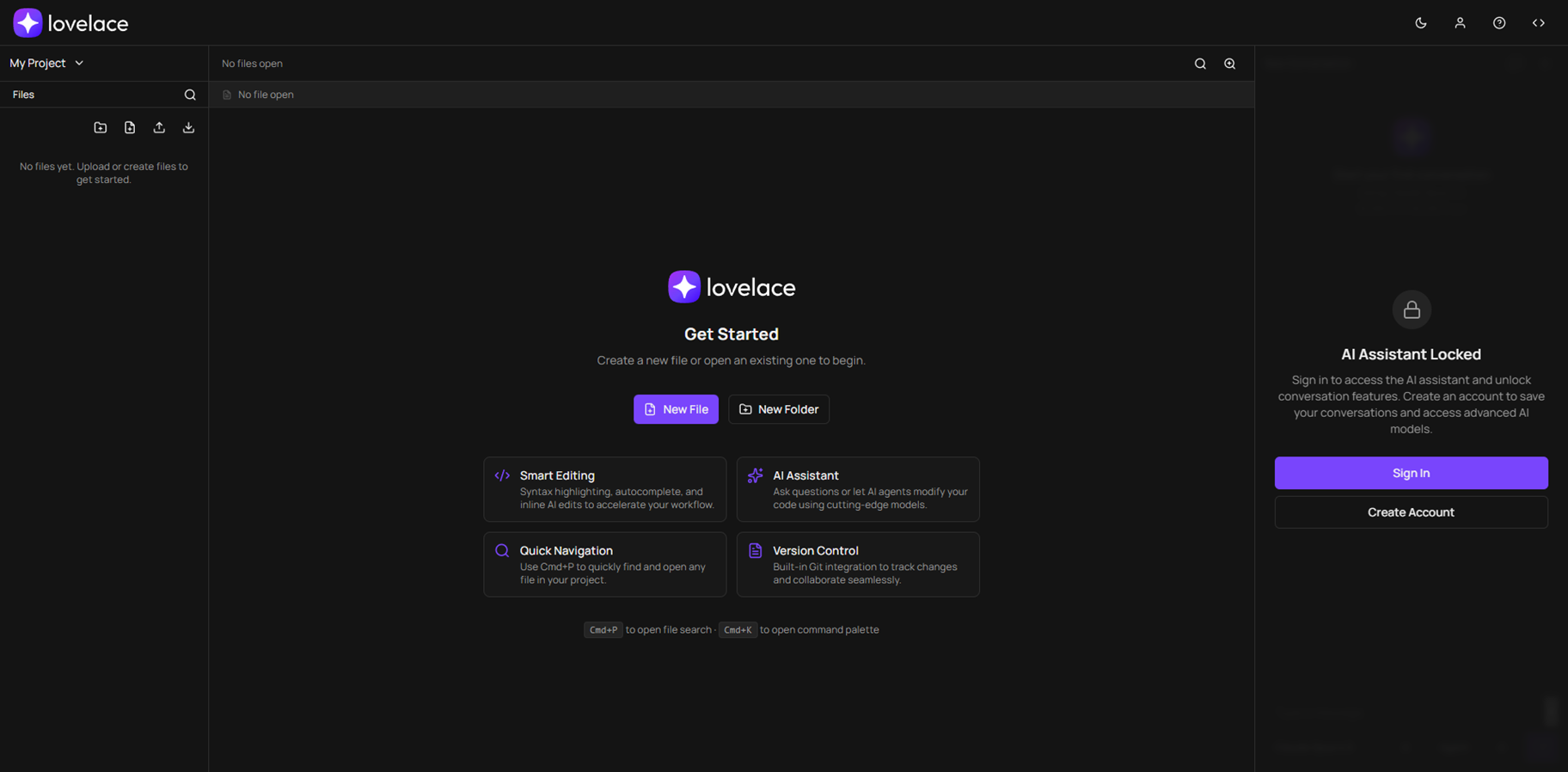

Lovelace
Lovelace is an AI-native Integrated Development Environment (IDE) tailored for enterprise engineering teams, boosting coding speed up to 4x with intelligent agents, context-aware autocomplete, and inline editing. Named after Ada Lovelace, it acts as a smart teammate that handles multi-step tasks like rewriting logic or updating dependencies across codebases via simple prompts. Secure by design, it aligns with ISO 27001, SOC 2, GDPR, and data sovereignty laws, never training on your IP, and offers risk monitoring for threats in code and dependencies. Integrates with Jira and monday.com for seamless workflows, enables team collaboration on prompts and reviews, and supports region-specific data storage. Currently available via Adaca's AI Pods, with public release planned for Q3 2025.


Lovelace
Lovelace is an AI-native Integrated Development Environment (IDE) tailored for enterprise engineering teams, boosting coding speed up to 4x with intelligent agents, context-aware autocomplete, and inline editing. Named after Ada Lovelace, it acts as a smart teammate that handles multi-step tasks like rewriting logic or updating dependencies across codebases via simple prompts. Secure by design, it aligns with ISO 27001, SOC 2, GDPR, and data sovereignty laws, never training on your IP, and offers risk monitoring for threats in code and dependencies. Integrates with Jira and monday.com for seamless workflows, enables team collaboration on prompts and reviews, and supports region-specific data storage. Currently available via Adaca's AI Pods, with public release planned for Q3 2025.


Lovelace
Lovelace is an AI-native Integrated Development Environment (IDE) tailored for enterprise engineering teams, boosting coding speed up to 4x with intelligent agents, context-aware autocomplete, and inline editing. Named after Ada Lovelace, it acts as a smart teammate that handles multi-step tasks like rewriting logic or updating dependencies across codebases via simple prompts. Secure by design, it aligns with ISO 27001, SOC 2, GDPR, and data sovereignty laws, never training on your IP, and offers risk monitoring for threats in code and dependencies. Integrates with Jira and monday.com for seamless workflows, enables team collaboration on prompts and reviews, and supports region-specific data storage. Currently available via Adaca's AI Pods, with public release planned for Q3 2025.
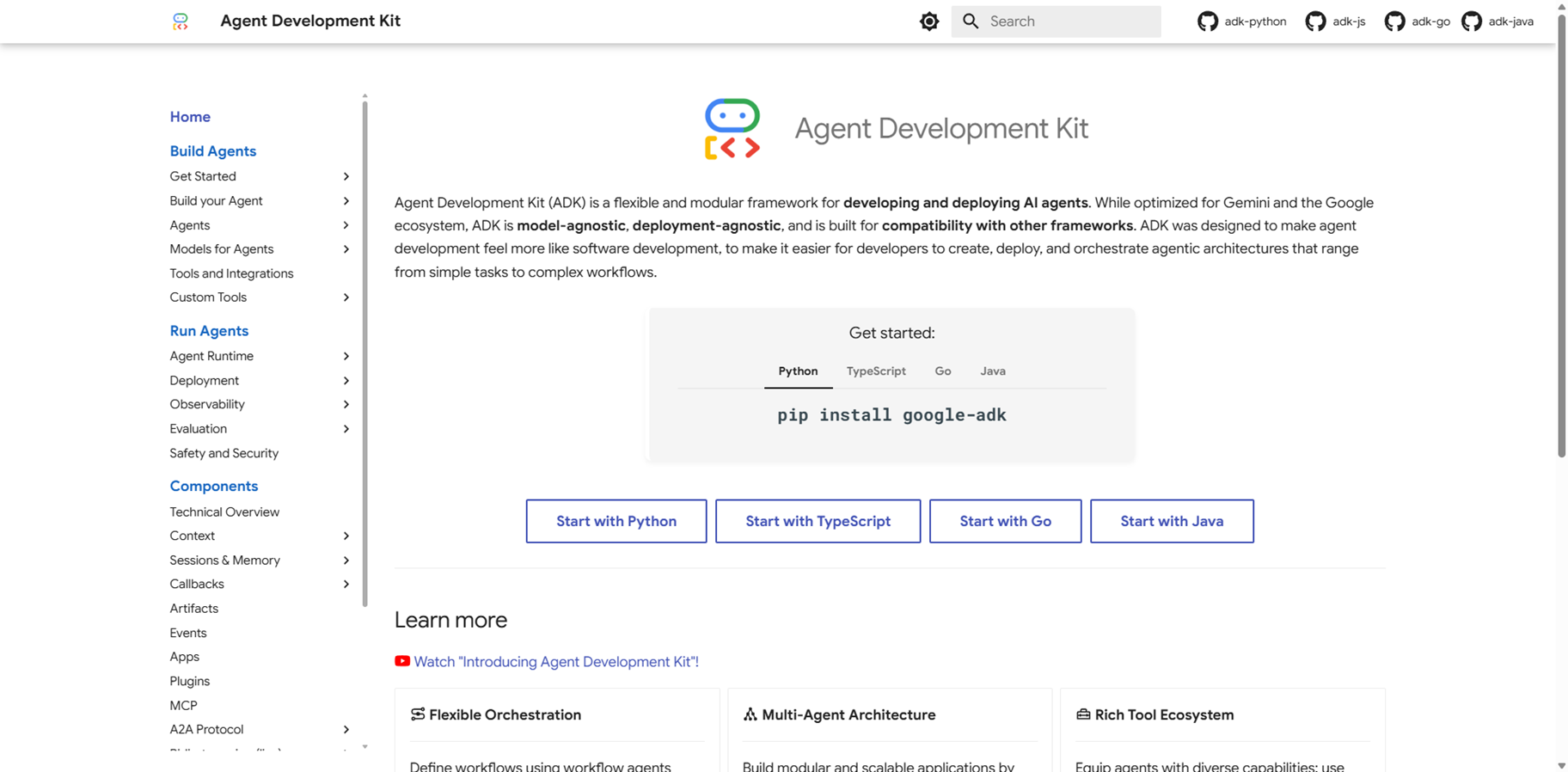
Agent Development Kit (ADK) is a flexible, open-source framework from Google for developing and deploying AI agents, optimized for Gemini and the Google ecosystem but model-agnostic and compatible with other frameworks. It treats agent development like software engineering with modular components for single or multi-agent systems, supporting hierarchical coordination, LLM-driven delegation, and rich tools including pre-built like search and code execution, custom functions, third-party integrations, and agents as tools. Developers benefit from workflow orchestration via Sequential, Parallel, Loop agents or dynamic LlmAgent transfer, built-in evaluation of responses and trajectories, native multimodal streaming for text/audio, CLI and Developer UI for debugging/visualization, containerized deployment to Vertex AI Agent Engine, Cloud Run, or Docker, and security patterns for safe agents. Available in Python, TypeScript, Go, Java with quick starts.

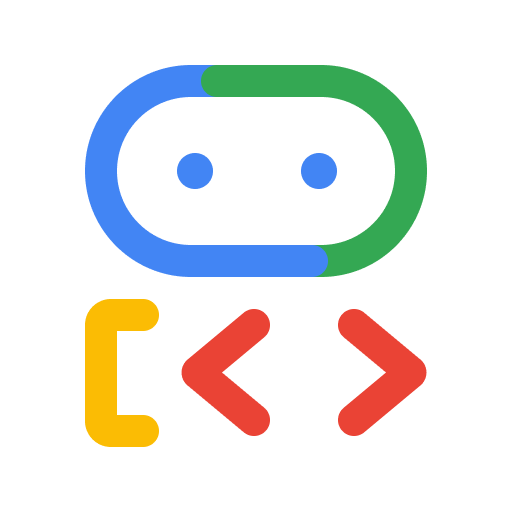
Agent Development ..
Agent Development Kit (ADK) is a flexible, open-source framework from Google for developing and deploying AI agents, optimized for Gemini and the Google ecosystem but model-agnostic and compatible with other frameworks. It treats agent development like software engineering with modular components for single or multi-agent systems, supporting hierarchical coordination, LLM-driven delegation, and rich tools including pre-built like search and code execution, custom functions, third-party integrations, and agents as tools. Developers benefit from workflow orchestration via Sequential, Parallel, Loop agents or dynamic LlmAgent transfer, built-in evaluation of responses and trajectories, native multimodal streaming for text/audio, CLI and Developer UI for debugging/visualization, containerized deployment to Vertex AI Agent Engine, Cloud Run, or Docker, and security patterns for safe agents. Available in Python, TypeScript, Go, Java with quick starts.


Agent Development ..
Agent Development Kit (ADK) is a flexible, open-source framework from Google for developing and deploying AI agents, optimized for Gemini and the Google ecosystem but model-agnostic and compatible with other frameworks. It treats agent development like software engineering with modular components for single or multi-agent systems, supporting hierarchical coordination, LLM-driven delegation, and rich tools including pre-built like search and code execution, custom functions, third-party integrations, and agents as tools. Developers benefit from workflow orchestration via Sequential, Parallel, Loop agents or dynamic LlmAgent transfer, built-in evaluation of responses and trajectories, native multimodal streaming for text/audio, CLI and Developer UI for debugging/visualization, containerized deployment to Vertex AI Agent Engine, Cloud Run, or Docker, and security patterns for safe agents. Available in Python, TypeScript, Go, Java with quick starts.
Editorial Note
This page was researched and written by the ATB Editorial Team. Our team researches each AI tool by reviewing its official website, testing features, exploring real use cases, and considering user feedback. Every page is fact-checked and regularly updated to ensure the information stays accurate, neutral, and useful for our readers.
If you have any suggestions or questions, email us at hello@aitoolbook.ai
